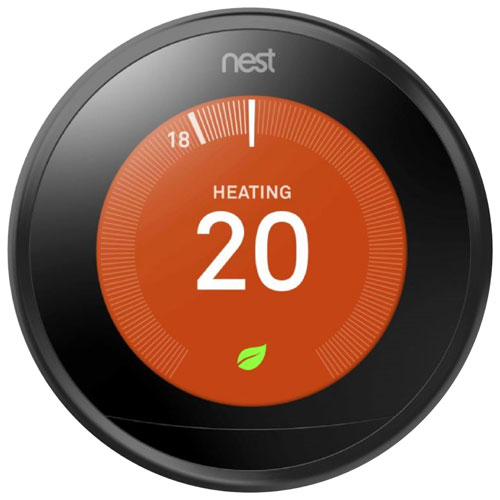- Important note: Check your existing heating and cooling systems, as this product works with forced air, heat pump, radiant or central HVAC systems, and does not work with electric baseboard heating; if you have vents in your walls, a boiler in the basement, central air conditioning, or floors that heat/cool, this thermostat will work
What you need to know:
- Innovation upgraded: The 3rd generation Google Nest Learning Thermostat is slimmer, but offers a big 2.08" 24-bit colour LCD display, with sharper 480 x 480 resolution that makes it even easier to read. With Farsight, it knows you're around and lights up so you can check the temperature, or time, at a glance from across the room.
- Reduce your energy bill: Nest uses smart learning technology and learns your schedule and heating/cooling preferences over time. It then takes this data and programs itself in a way that reduces overall energy usage up to 20%. The environment and your wallet will thank you.
- Smart savings: Nest is smart enough to turn down the thermostat when you're away at work, and it displays the Leaf icon to show you when it's at a temperature that's saving you money. Airwave automatically reduces air conditioning usage when indoor humidity isn't too high, so you'll get reduced energy bills while keeping the house cool.
- Connectivity: Nest connects with your home's WiFi network so you can control it from your smartphone, tablet, or laptop from anywhere in the world. Compatible with mobile devices that use iOS 8 or later, or Android 4 or later with the free Nest app and Bluetooth 4.0 or set it up from your computer using USB connectivity and a web browser.
- Remote monitoring: You can view Energy History on the Nest Mobile or Web apps so you can get detailed information about your energy usage and figure out how best to save. Plus, Nest lets you know something is out of the ordinary, like if the temperature is too low or too high, with an alert to your mobile device. You can even control your Google Nest Thermostat from your Apple Watch.
- Weather aware: Nest monitors weather conditions so it can figure out how outdoor temperatures and weather affects your heating and cooling needs.
- Convenient voice controls: Works with Google Assistant for convenient voice controls.
- Smart device compatibility: Since Nest is smart and WiFi-connected, it's able to work with a variety of other smart devices to provide additional convenience and functionality, and the list of compatible devices is growing all the time.
- Easy installation: As easy as installing a lighting fixture, Nest is simple to install, and probably in less than 30 minutes. If you'd rather let a professional handle it, you can contact a Google Nest Pro to install Nest, remove and recycle your old thermostat, and connect Nest to your WiFi network.
CompatibilityNest works with over 95% of 24V heating and cooling systems, including gas, electric, oil, solar, hot water, geothermal, forced air, heat pump and radiant.
- Heating: one, two, and three stages (W1, W2, W3)
- Cooling: 1 and 2 Stages (Y1, Y2)
- Heat Pump: with auxiliary and emergency heat (O/B, AUX, E)
- Fan (G)
- Power (C, Rh, Rc)
- Whole home humidifier or dehumidifier (HUM, DEHUM)* - professional installation recommended
- Dual fuel systems (heat pump with furnace)* - professional installation recommended
- Common wire not required in 99% of installations
IncompatibilityThe Google Nest Learning Thermostat is not compatible with line voltage, millivolt systems or low voltage systems with incompatible wires. The Google Nest Thermostat is not compatible with some systems without a common wire installed.
The Google Nest Learning Thermostat is only compatible with low voltage 24 volt systems, not line voltage or millivolt systems. While most low voltage systems are compatible with the Google Nest Thermostat, here are some exceptions:
Incompatible systems:
- Remote sensors. While the Google Nest Thermostat may be compatible with this system, it won't be able to gather data from existing remote sensors.
- Proprietary systems. Proprietary systems use a serial communications protocol to communicate between the system and the thermostat. The Google Nest Thermostat can't communicate with serial protocols, though some proprietary systems can be wired with standard HVAC wires.
- Some micro-controller based systems. Systems that use micro-controllers instead of relays are sometimes more sensitive to power sharing. If so, the Google Nest Thermostat may need a common wire to be compatible with these systems.
- High impedance systems. Some systems with particularly high impedance can't deliver enough power to the Google Nest Thermostat over the HVAC wires. If so, the Google Nest Thermostat will need a common wire to be compatible with these systems.
- Incompatible wiring:
- Three-stage cooling. The 3rd generation Google Nest Learning Thermostat is only compatible with systems that have one- and two-stage cooling.
- International systems. Some international systems, such as Buderus boilers, have dry contacts or other incompatible wiring. These systems may require relay panels in order to be installed with standard American thermostat wiring.
- Heat pumps with L wires. The Google Nest Thermostat doesn't support Service Indicator (L) wires.
Incompatible hardware:Zone relay panels or control panels. Some systems have control panels or equipment interface modules that require a common wire to be compatible with the Google Nest Thermostat.
Here's a list of known panels that require a common wire:
- Honeywell AQ25110B
- Honeywell EMM-3
- Honeywell TZ-4
- Honeywell HZ311
- Bryant 548F036
- White-Rogers 36C03-300
- Carrier HK42FZ011
- Nordyne 624631-A
- Nordyne 903915A
- Waterfurnace ATV045A 110CIT
Some gas valves on systems vibrate or buzz when the Google Nest Thermostat is installed. This can usually be fixed by connecting a common wire.
